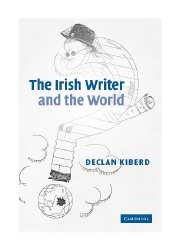Book contents
- Frontmatter
- Contents
- Acknowledgements
- A note on the text
- 1 Introduction
- 2 The fall of the Stage Irishman (1979)
- 3 Storytelling: the Gaelic tradition (1978)
- 4 Writers in quarantine? The case for Irish Studies (1979)
- 5 Synge, Yeats and bardic poetry (2002)
- 6 George Moore's Gaelic lawn party (1979)
- 7 The flowering tree: modern poetry in Irish (1989)
- 8 On national culture (2001)
- 9 White skins, black masks: Celticism and Négritude (1996)
- 10 From nationalism to liberation (1997)
- 11 The war against the past (1988)
- 12 The Elephant of Revolutionary Forgetfulness (1991)
- 13 Reinventing England (1999)
- 14 Museums and learning (2003)
- 15 Joyce's Ellmann, Ellmann's Joyce (1999)
- 16 Multiculturalism and artistic freedom: the strange death of Liberal Europe (1993)
- 17 The Celtic Tiger: a cultural history (2003)
- 18 The city in Irish culture (2002)
- 19 Strangers in their own country: multiculturalism in Ireland (2001)
- Index
- References
10 - From nationalism to liberation (1997)
Published online by Cambridge University Press: 22 September 2009
- Frontmatter
- Contents
- Acknowledgements
- A note on the text
- 1 Introduction
- 2 The fall of the Stage Irishman (1979)
- 3 Storytelling: the Gaelic tradition (1978)
- 4 Writers in quarantine? The case for Irish Studies (1979)
- 5 Synge, Yeats and bardic poetry (2002)
- 6 George Moore's Gaelic lawn party (1979)
- 7 The flowering tree: modern poetry in Irish (1989)
- 8 On national culture (2001)
- 9 White skins, black masks: Celticism and Négritude (1996)
- 10 From nationalism to liberation (1997)
- 11 The war against the past (1988)
- 12 The Elephant of Revolutionary Forgetfulness (1991)
- 13 Reinventing England (1999)
- 14 Museums and learning (2003)
- 15 Joyce's Ellmann, Ellmann's Joyce (1999)
- 16 Multiculturalism and artistic freedom: the strange death of Liberal Europe (1993)
- 17 The Celtic Tiger: a cultural history (2003)
- 18 The city in Irish culture (2002)
- 19 Strangers in their own country: multiculturalism in Ireland (2001)
- Index
- References
Summary
For most of the nineteenth century, and for some time before that, England and the English had been presented to Irish minds as the very epitome of the human norm. Only with the onset of the Irish Renaissance did it begin to become clear that, far from being normal, England's was an exceptionally stressed society, whose vast imperial responsibilities were discharged only at an immense psychological and social cost. In some ways, the invention of modern Ireland had far more in common with the state-formation of other European countries such as Italy or France. In other respects, the analogies – especially in the domain of culture – would be with the emerging peoples of the decolonising world. The debates about language revival, like the arguments about nationality and cosmopolitanism in literature, anticipated those which would later be conducted in Africa and Asia, just as Pan-Celticism seemed to resonate with Pan-Africanism. One abiding difference, however, which left the Irish experience unique, was the sheer proximity of the imperial power, as a not-always-appreciated model, as a source of ideas, and as a market for surplus theories and labour. Also important was the significant number of Irish persons recruited into the imperial service overseas, as Joyce acidly noted in his passage about examination results in A Portrait of the Artist as a Young Man.
The revivalist myth of the Irish as ‘a people like no other race on earth’ militated against the comparative method.
- Type
- Chapter
- Information
- The Irish Writer and the World , pp. 146 - 157Publisher: Cambridge University PressPrint publication year: 2005
References
- 1
- Cited by



